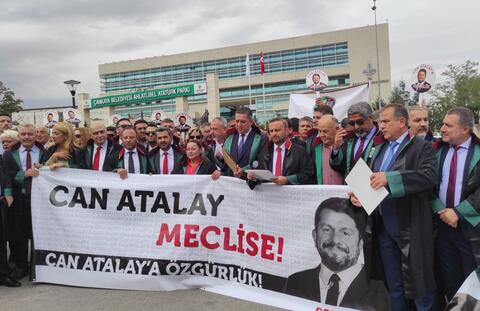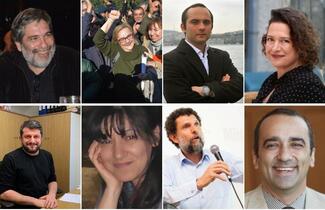
Lawyers from the Union of Turkish Bar Associations (TBB) and 55 bar associations gathered today in front of the Constitutional Court (AYM) for Gezi protester and lawyer Can Atalay, who was elected as a Member of Parliament from the Workers Party of Turkey (TİP) in the May 14 elections.
TBB President Erinç Sağkan, TBB Board members, and bar association presidents from Adana, Bitlis, Osmaniye, Adıyaman, Ağrı, Amasya, Ankara, Antalya, Ardahan, Artvin, Aydın, Balıkesir, Bartın, Batman, Bilecik, Bingöl, Bolu, Burdur, Bursa, Çanakkale, Çankırı, Diyarbakır, Düzce, Edirne, Eskişehir, Antep, Giresun, Hatay, Hakkari, Isparta, İstanbul, İzmir, Kars, Kayseri, Kırklareli, Kocaeli, Kütahya, Mardin, Mersin, Muğla, Muş, Nevşehir, Sakarya, Samsun, Siirt, Sinop, Urfa, Şırnak, Tekirdağ, Dersim, Trabzon, Van, Yalova, Ordu, Zonguldak, and hundreds of lawyers gathered at Çankaya Belediyesi Ahlatlıbel Atatürk Park.
Here, Hüseyin Cihat Açıkalın, the President of the Hatay Bar Association, began his speech by conveying the greetings of the people of Hatay, where Atalay was elected as a Member of Parliament. During the statement, slogans of "Hatay people want their representative" were chanted.
Açıkalın demanded the implementation of the provisions of the Constitution and the immediate release of Can Atalay.
TBB President Erinç Sağkan talked next and he said, "Preventing an elected member of parliament from participating in legislative activities is tantamount to disregarding the will of the voters along with their right to be elected."
Sağkan said the following:
"It should not be forgotten that our colleague Can Atalay is an elected member of parliament, and there is no final conviction against him. According to Article 3 of the Constitution, a member of parliament who is alleged to have committed a crime before or after the election cannot be detained, interrogated, arrested, or tried without the decision of the Parliament.
"Preventing an elected member of parliament from participating in legislative activities, disregarding the will of the voters along with their right to be elected, and obstructing their representation in the Parliament cannot be normalized in any democracy."
What happened?
Can Atalay was sentenced to 18 years in prison on April 25, 2022, in the case concerning the 2013 Gezi Park protests, on the charge of "aiding an attempt to overthrow the government."
After the court of appeals upheld the conviction on December 28, 2022, the case was appealed to the Court of Cassation.
Can Atalay was elected as an MP for the TİP in the May 14 elections with 75,720 votes.
On May 25, after receiving his parliamentary mandate through his lawyer, a release application was made via the National Judiciary Informatics System (UYAP) on the same day, and, a day later, an application was filed with the Court of Cassation.
However, the Court of Cassation's 3rd Criminal Chamber unanimously rejected the release request on July 13, ignoring the precedent decisions of the Constitutional Court.
Subsequently, the appeal against this decision was rejected by a majority of four against one by the Court of Cassation's 4th Criminal Chamber, which approved the 3rd Criminal Chamber's decision.
Atalay's lawyers stated that the trial could not proceed without the decision of the parliament to lift his parliamentary immunity, requesting a stay of proceedings from the Court of Cassation and the release of Atalay.
In the application, the lawyers referred to Articles 14 (Prevention of the abuse of fundamental rights and freedoms), 67 (Right to vote, be elected, and engage in political activities), and 83 (Legislative immunity) of the Constitution.
Emphasizing Article 83, which states, "A deputy who is alleged to have committed a crime before or after the elections cannot be detained, interrogated, arrested, or tried without the permission of the Assembly," the lawyers argued that Atalay's situation does not contradict Article 14, which is decisive regarding immunity.
The Chief Public Prosecutor's Office of the Court of Cassation expressed its opinion that the sentences of seven people, including Can Atalay, who are imprisoned for their convictions in the Gezi trial, should be upheld, but that in contrast, Mücella Yapıcı's sentence should be overturned.
The prosecutor also argued that the crime for which Can Atalay was convicted falls under the crimes to be evaluated within the scope of Article 14 of the Constitution and demanded the rejection of Atalay's lawyers' request for a "stay of proceedings" in the trial.



